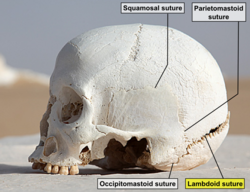Lambdoid suture
| Lambdoid suture | |
|---|---|

Lambdoid suture (shown in red line)
|
|

Lambdoid suture (labeled at bottom right)
|
|
| Details | |
| Identifiers | |
| Latin | sutura lambdoidea |
| Dorlands /Elsevier |
12774079 |
| TA | A03.1.02.004 |
| FMA | 52933 |
|
Anatomical terms of bone
[]
|
|
The lambdoid suture (or lambdoidal suture) is a dense, fibrous connective tissue joint on the posterior aspect of the skull that connects the parietal bones with the occipital bone. It is continuous with the occipitomastoid suture.
Its name comes from its uppercase lambda-like shape.
At birth, the bones of the skull do not meet. If certain bones of the skull grow too fast, then craniosynostosis (premature closure of the sutures) may occur. This can result in skull deformities. If the lambdoid suture closes too soon on one side, the skull will appear twisted and asymmetrical, a condition called "plagiocephaly." Plagiocephaly refers to the shape and not the condition. The condition is craniosynostosis.
The lambdoidal suture articulates with the occipital bone and parietal bones.
Animation. Lambdoid suture shown in red.
Parietal bones (above) and occipital bone (below).
Skull seen from behind. Showing Λ-like shape of the lambdoid suture.
Lambdoid suture seen from above.
Lambdoid suture seen from inside.
Lambdoid suture, medial view. Indicated by yellow line.
Lambdoid suture with wormian bones, seen from behind.
...
Wikipedia
